 Petzlover
Petzlover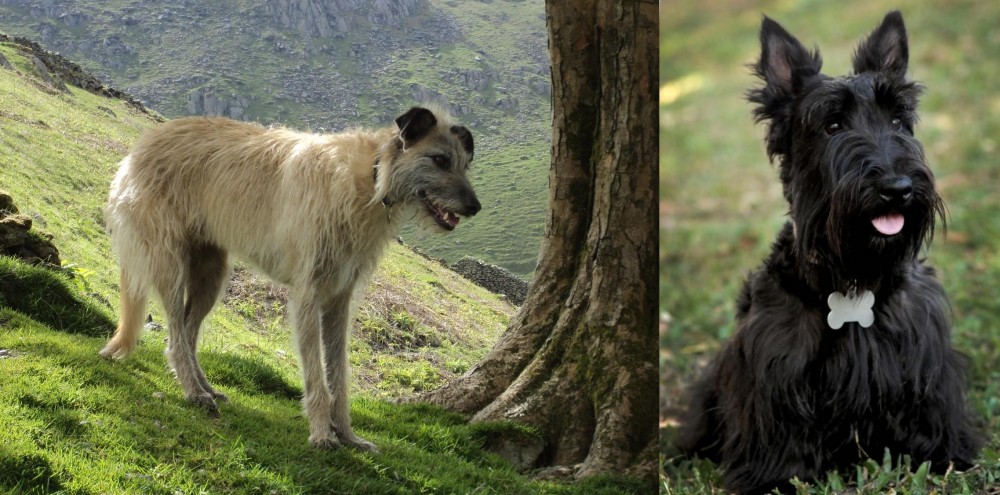 Both Lurcher and Scoland Terrier are originated from United Kingdom. Lurcher may grow 48 cm / 19 inches higher than Scoland Terrier. Lurcher may weigh 22 kg / 49 pounds more than Scoland Terrier. Both Lurcher and Scoland Terrier has almost same life span. Both Lurcher and Scoland Terrier has same litter size. Lurcher requires Low Maintenance. But Scoland Terrier requires High Maintenance
Both Lurcher and Scoland Terrier are originated from United Kingdom. Lurcher may grow 48 cm / 19 inches higher than Scoland Terrier. Lurcher may weigh 22 kg / 49 pounds more than Scoland Terrier. Both Lurcher and Scoland Terrier has almost same life span. Both Lurcher and Scoland Terrier has same litter size. Lurcher requires Low Maintenance. But Scoland Terrier requires High Maintenance
 The Lurcher is a crossbreed dog that doesn’t seem to have too much certainty around it. There are stories that Lurchers may have been bred to produce a sighthound with more intelligence for hunting.
The Lurcher is a crossbreed dog that doesn’t seem to have too much certainty around it. There are stories that Lurchers may have been bred to produce a sighthound with more intelligence for hunting.
Hunters discovered that breeding certain breeds with sight-hounds produced a dog better suited for hunting and working purpose.
A Lurcher is a sighthound, a classic working crossbreed and some of the dogs used to bring about this breed were Greyhounds, Deerhounds, Whippets, Border Collies, Bedlington Terriers and Irish Wofhounds among others. This means that the Lurcher has many different looks as well. In the UK, Lurchers have their own shows, but no registry recognizes the dog.
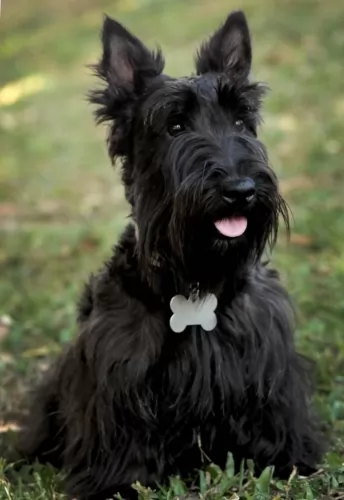 Not much is known about the Scoland Terrier. It is not a purebred but rather a crossbreed developed by crossing the Scottish Terrier with the Westland Terrier. To understand these mixed breeds, look to the original breeds for any combination of the characteristics of the breeds. The offspring of this crossing is not a 50-50 split of the original breeds looks or temperament.
Not much is known about the Scoland Terrier. It is not a purebred but rather a crossbreed developed by crossing the Scottish Terrier with the Westland Terrier. To understand these mixed breeds, look to the original breeds for any combination of the characteristics of the breeds. The offspring of this crossing is not a 50-50 split of the original breeds looks or temperament.
Because the Scoland Terrier is a mix between the Scottie and the Westie he has all the characteristics of a typical terrier perhaps even twice as much. With both parents being terriers, you can expect your Scoland to act like a short legged terrier. These dogs are known for their courage and tenacity. Today these terriers are family companions. Most terriers today come from a pool of ancestral dog in the 19th century in Europe. This information was gleaned from a genetic analysis done in 2006.
The Scoland Terrier, being a hybrid, is not acknowledged by the American Kennel Club (AKC) or the United Kennel Club (UKC). It is acknowledged by the International Designer Canine Registry (IDCR), American Canine Hybrid Club (ACHC), Dog Registry of America, Inc. (DRA), Designer Dogs Kennel Club (DDKC) and Designer Breed Registry (DBR).
 It is difficult to put a size and weight to the Lurcher, This is because of the many dogs used in his development, so that they vary in size and coat type. Generally though, he is a deep chested dog that stands roughly between 50 – 75cm and weighs 25 – 32kg.
It is difficult to put a size and weight to the Lurcher, This is because of the many dogs used in his development, so that they vary in size and coat type. Generally though, he is a deep chested dog that stands roughly between 50 – 75cm and weighs 25 – 32kg.
However, because Whippet was a dog used in his development, he could be as small as a Whippet, the size of a Greyhound or Deerhound.
Generally he has a shortish coat. Colours of the coat vary greatly so you can find fawn, cream, white, grey, black, tan, silver or grey and bi-colored. The ears are usually small and can be floppy or held erect or back and the tail is usually long.
The Lurcher’s temperament is much like that of the sighthound – loving and calm. It is a good idea to have the Lurcher trained and socialized to help prevent both timidity or aggression.
He is an independent and intelligent dog and can be easily trained. He is a gentle dog and will get on well with children and pets in the home as he is a fairly relaxed breed with a quiet temperament, loving to spend time with his human family. Another advantage is that he is low maintenance and makes a great pet when shown love and care.
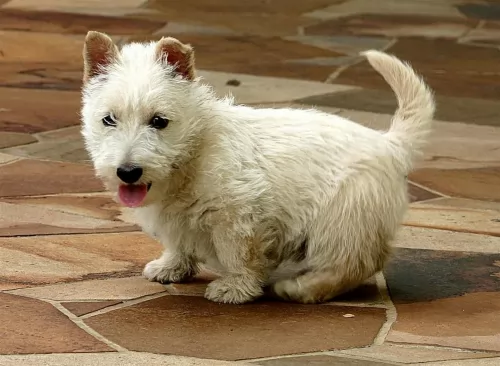 Being a hybrid, the Scoland Terrier will not always look alike and could look like a Scottie, a Westie or a combination of the two. Most breeders of this designer dog say it usually has a body like the Scottie and a round head like the Westie. They are more often black with white markings, but they can often be wheaten as well. With round dark eyes, a scissors bite and black nose, her face is unique. The breed has erect and small, triangular ears and a medium fluffy tale. The coat is hard and wiry, with a dense soft undercoat.
Being a hybrid, the Scoland Terrier will not always look alike and could look like a Scottie, a Westie or a combination of the two. Most breeders of this designer dog say it usually has a body like the Scottie and a round head like the Westie. They are more often black with white markings, but they can often be wheaten as well. With round dark eyes, a scissors bite and black nose, her face is unique. The breed has erect and small, triangular ears and a medium fluffy tale. The coat is hard and wiry, with a dense soft undercoat.
 The Lurcher is a working- and hunting dog that won’t do well in the city, as he requires large spaces to run.
The Lurcher is a working- and hunting dog that won’t do well in the city, as he requires large spaces to run.
He is a dog that will need you to provide him with games and other activities as well as a walk every day to keep him fit and lithe. He will therefore require an owner who loves to be active and who is consistent, firm, fair, patient and kind.
With the right human family, the Lurcher is a loving, devoted dog who will make an excellent family pet.
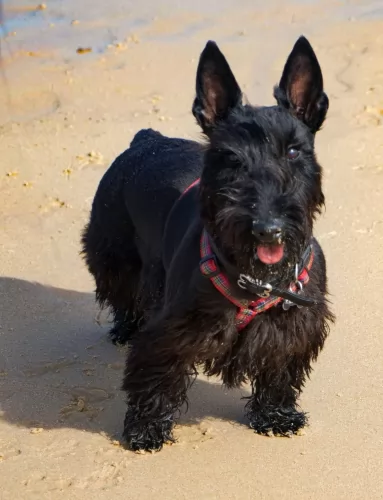 1.Children friendliness - they can be very good with children and children can help them get their exercise.
1.Children friendliness - they can be very good with children and children can help them get their exercise.
3.Adaptability - yes but she is adept at digging and must have a safe enclosure.
 Every dog has the potential to develop genetic health problems, but the way you feed a dog and look after it will play a huge role in his wellbeing.
Every dog has the potential to develop genetic health problems, but the way you feed a dog and look after it will play a huge role in his wellbeing.
Lurchers are looked upon as being a pretty healthy dog breed and they can be with you for between 10 and 15 years.
Some of the main health concerns with this dog would be bloat, ear- and eye infections or heatstroke.
Remember that if you’re getting a new puppy, you can prevent some of the major life-threatening diseases by having your puppy vaccinated.
Dogs pant heavily when they’re hot. When the panting isn’t enough, the dog’s body temperature rises and this can be fatal for your pet.
The signs of heatstroke in dogs include vomiting, diarrhea, dullness and loss of consciousness. Being locked in a hot car, being over-exercised or left in a yard without shade and water can bring on heatstroke.
It is imperative to remove the dog from the hot place immediately and cool him down by spraying cold water gently over him while making sure no water enters the mouth or nose. Get him to the vet if you can because of shock and the fact that other problems could have developed.
 This hybrid dog can inherit any of the issues faced by its two parent breeds. For the Scoland Terrier this can include:
This hybrid dog can inherit any of the issues faced by its two parent breeds. For the Scoland Terrier this can include:
• Seborrhea – Skin disease that can cause dogs to scratch until bleeding and/or infected.
• Carniomandibular Osteopathy -called lion’s jaw this is a developmental disease that causes extensive changes in the bones of the mandible and skull.
• Pulmonic Stenosis – when the blood flowing from the heart’s right ventricul to the pulmonary artery is blocked.
• PPM or Persistent Pupillary Membranes - causes visual impairment when the membranes do not dissolve after birth.
• Chronic Hepatitis – disease of the liver that can eventually cause major damage.
 Brush your pet’s coat at least twice a week.
Brush your pet’s coat at least twice a week.
The Lurcher just loves to run and be free, so this is a dog that will want a long walk every day.
Check his eyes and inside his ears for ear infection. Find out how to clean inside the ears and make sure they are kept dry.
Keep his nails clipped, as long nails can hook and cause painful injury to the paw area. Check his teeth too and brush them because dental disease is the root cause of many other diseases.
Make sure your dog has a comfy, dry, warm place to sleep.
Encourage health and longevity by giving your pet high quality food full of vitamins and minerals. If you’re going be giving him commercially manufactured food, make sure its one of the better ones. Try and add in homemade food such as boiled chicken, brown rice and vegetables and add this to his kibble as a tasty treat. Some raw meat added in when you can afford it will also be to his advantage.
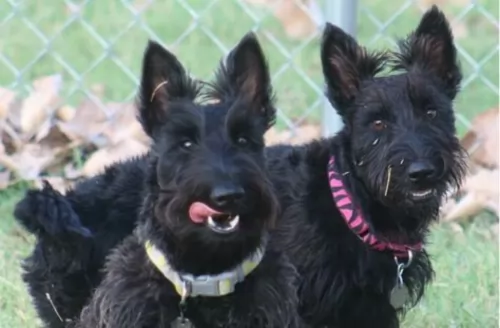 1.Feeding the puppy - Give a high quality puppy dog food designed for terriers or active medium sized dogs. Give ¾ of a cup over 3 meals a day.
1.Feeding the puppy - Give a high quality puppy dog food designed for terriers or active medium sized dogs. Give ¾ of a cup over 3 meals a day.
2.Feeding the adult – Give a high quality adult dog food designed for terriers or active medium sized dogs. Give one cup over two meals a day.
4. Games and Exercises – The Scoland Terrier is a very active dog and needs daily exercise, He need time to play, run, and be stimulated by games. She would be very good at flyball, Frisbee, fetch, agility, barn hunt, and obedience. He needs at least 2 hours of play and exercise everyday.